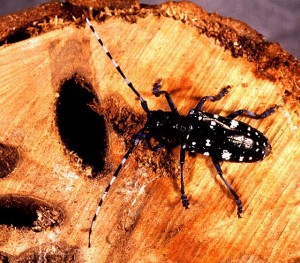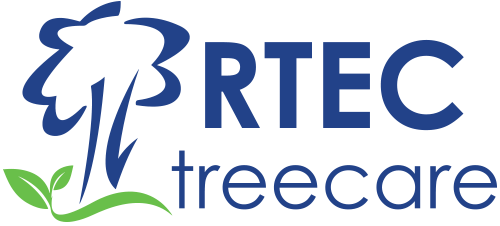
Wood boring insects are one of the most destructive pests that plague a wide variety of tree species. These borers tunnel through the tree’s bark, feed on it’s tissue, and overwinter within the tree. Wood Boring insects are extremely destructive because they kill trees from the inside out. They do this by feeding on the vascular tissue, which reduces the tree’s ability to transfer energy and nutrients.
Wood boring insects in our area include the Asian Longhorned Beetle, Bronze Birch Borer, and Ambrosia Beetle.
Signs Of Wood Boring Insects

- Entry/exit holes in the bark.
- Small mounds of sawdust at the base of the tree.
- Sections of the crown wilting and dying.
Although wood boring insects can severely damage your tree and should be treated by a Certified Arborist, they are really just a sign pointing to a larger problem.
Secondary Invaders
Wood Boring insects, like the Ambrosia beetle, rarely infest healthy trees. Instead these borers are known for being secondary invaders. Secondary invaders are pests that only infect trees after they are in a weakened state. This weakened state can be created by what are called stressors. Stressors are environmental or human inflicted situations that increase the tree’s susceptibility to attack; similar to how our immune system lowers when we don’t get much sleep, thus we end of catching a cold. For trees stressors typically include drought, soil compaction, sun scald, or injuries. When a tree is exposed to stressors they become an easy target for insects and diseases.
Many theories have been proposed for why this phenomenon occurs. The two biggest being, the idea of insects and diseases responding to tree stress pheromones and the idea of insects and diseases responding to trees running a fever when stressed. At the end of the day researchers are not positive how insects and diseases spot weakened trees but they are positive it happens and that it’s imperative to protect our trees from becoming easy targets.
Don’t See Signs Of Wood Boring Insects?
If you don’t see signs of wood boring insects on your trees this is a great opportunity to have an Arborist evaluate your tree’s stressors and create a plan to keep your tree as healthy as possible and prevent secondary invaders like wood boring insects.
See Signs Of Wood Boring Insects?
To combat Wood Boring insects our Arborists recommend treating the tree with an insecticide as well as identifying and treating the underlying stressors that led to your tree being infected by secondary invaders in the first place.
If you have a Canopy Protection Program don’t fret; our arborists will easily be able to combat these pests and stressors on your property. Just give us a call at 703.573.3029 or email us and let us know your seeing signs of wood boring insects.
